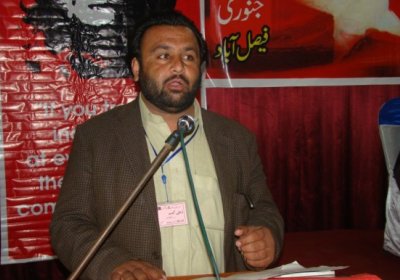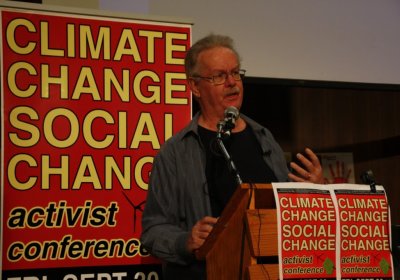Ian Angus is a Canadian ecosocialist activist and author. The editor of Climateandcapitalism.com, Angus is also the co-author of Too Many People? Population, Immigration, and the Environmental Crisis with former Green Left Weekly editor Simon Butler (Haymarket, 2011).
Ian Angus
 “Potentially the most widespread and globally synchronous anthropogenic signal is the fallout from nuclear weapons testing.”
Repeatedly, over hundreds of thousands of years, glaciers expanded south and north from the polar regions, covering much of the Earth with ice sheets several kilometres deep.
“Potentially the most widespread and globally synchronous anthropogenic signal is the fallout from nuclear weapons testing.”
Repeatedly, over hundreds of thousands of years, glaciers expanded south and north from the polar regions, covering much of the Earth with ice sheets several kilometres deep.
Confronting Injustice: Social Activism in the Age of Individualism
Umair Muhammad
www.confrontinginjustice.com
Too many supposedly radical books are written by academics for academics, apparently competing to see who can produce the most incomprehensible prose.
My list of “books to be reviewed” contains literally dozens of overstuffed and overpriced volumes that only a handful of specialists will ever read, and with little relevance to the non-university world.
Remember all those articles that claimed global warming has stopped? Here’s proof that those were anti-scientific fantasies.
On July 21, the National Oceanic and Atmospheric Administration (NOAA) announced that last month’s average global temperature was 16.2°C, which is 0.7°C higher than the 20th-century average.
Heat records were broken on every continent apart from Antarctica. The rises were especially notable in New Zealand, northern South America, Greenland, central Africa and southern Asia.
By Light Alone
By Adam Roberts
2011
www.adamroberts.com
Progress under capitalism, Karl Marx wrote, resembles “that hideous, pagan idol, who would not drink the nectar but from the skulls of the slain”. Changes that ought to make life better often produce new social, economic and environmental disasters.
Deep Green Resistance: Strategy to Save the Planet
Aric McBay, Lierre Keith & Derrick Jensen
Seven Stories Press, 2011
In its March-April issue, Canadian Dimension magazine featured a very positive review of Deep Green Resistance. The reviewer said it “made me a better strategist,” and endorsed author Derrick Jenson’s assertion that “this book is about winning.”
The radical ecologist Murray Bookchin once compared populationism to a phoenix, the mythical bird that periodically burns up and is reborn from its own ashes. No matter how often the “too many people” argument is refuted, it always returns, making the same claim that people are breeding too much and consuming too much, devouring the Earth like a plague of locusts.
The latest incarnation of the populationist phoenix is People and the Planet, a report published in April by the leading organisation of Britain’s scientific establishment, the 350-year-old Royal Society.
The Labour Party of Pakistan has reported that LPP member Baba Jan and other activists in Gilgit district jail were severely beaten and tortured by dozens of Rangers, Police and Frontier Constabulary in the early morning of April 28.
In response, an international campaign is being organised for the release of Baba Jan and other activists jailed last year for campaigning for compensation for flood victims.
After devastating floods swept the Atta Abad Lakes region of Pakistan last year, police opened fire on a demonstration of people demanding compensation. Two people were killed.
In article after article, book after book, scientists and environmentalists have exposed the devastating effects of constant economic expansion on the global environment. The drive to produce ever more “stuff” is filling our rivers with poison and our air with climate-changing gases. The oceans are dying, species are dying out at unprecedented rates, water is running short, and soil is eroding much faster than it can be replaced.
But the growth machine pushes on.
Green Washed: Why We Can’t Buy Our Way to a Green Planet
Kendra Pierre-Louis
IG Publishing, 216 pages
Radical German poet Hans Magnus Enzenberger once compared mainstream environmentalism to a Sunday sermon that terrifies parishioners with dire warnings of eternal damnation, but concludes weakly by promising salvation to any sinner who performs a simple act of penance.
“The horror of the predicted catastrophe,” he wrote, “contrasts sharply with the mildness of the admonition with which we are allowed to escape.”
Ian Angus is editor of climateandcapitalism.com and co-author, with Simon Butler, of the new book Too Many People?. This is his keynote presentation to the recent Climate Change Social Change conference in Melbourne.
After the April 20 Deepwater oil well explosion in the Gulf of Mexico, many commentators have tried to explain why it happened. Many blame greed and arrogance in BP’s executive offices.
Others blame it on the military-oil-government alliance that views free-flowing oil (and free-flowing oil profits) as something to promote at all costs.
But some writers identify a different cause. Bonus-seeking executives, corrupt politicians and oil-hungry generals all played a role, but they were only front men for the real villains — consumers.
- Previous page
- Page 7
- Next page








